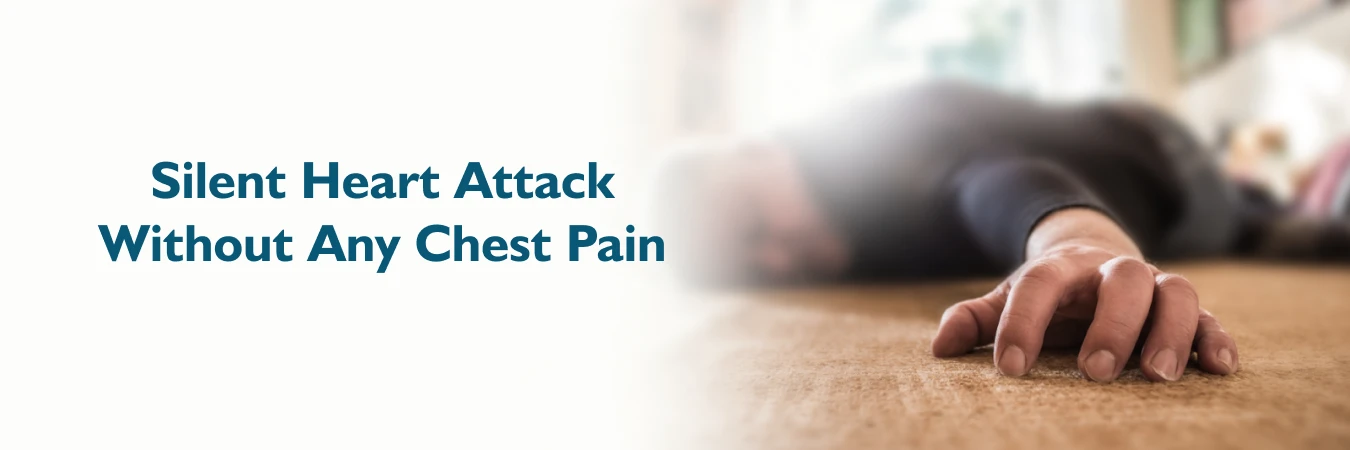- Cardiology 84
- Dermatology 45
- Endocrinology 33
- ENT 16
- Fertility 190
- Gastroenterology 78
- General-Medicine 81
- Gynecology 80
- Hematology 19
- Infectious-Diseases 33
- Neurology 52
- Oncology 34
- Ophthalmology 23
- Orthopedics 69
- Pediatrics 31
- Procedure 23
- Public-Health 144
- Pulmonology 59
- Radiology 8
- Urology 68
- Wellness 161
- Woman-and-child 77

Silent Heart Attack Without Any Chest Pain
Heart attacks have been on the rise, especially in the last few years. It strikes when no one is expecting it, leading to heart-related complications or even death.
A person can suffer a silent heart attack without any chest pains and not even realize it. A silent heart attack, silent ischemia, or silent myocardial infarction (SMI), is often found in women more than men
- Heart attacks have been on a rise, especially since the last few years.
- It strikes when no one is expecting it, leading to heart-related complications or even death.
- A person can suffer a silent heart attack without any chest pains and not even realize it.
- A silent heart attack, silent ischemia, or silent myocardial infarction (SMI), is often found in women more than men
Reasons For Silent Heart Attacks
Silent Heart Attacks involve the same risk factors as common heart attacks. They are as follows -
- Age factor
- Diabetes
- Obesity
- Hereditary heart disease
- High blood pressure
- No physical activity
- History of heart attack
- Tobacco use
- Stress factors
- Gender - More common in women
Consuming foods containing high cholesterol, salt, and unhealthy fats Having a one-time silent myocardial infarction (SMI) increases the chances of having another one, which could turn out to be fatal.
Silent Heart Attack Symptoms
The silent myocardial infarction (SMI) symptoms are not as critical as those of a common heart attack. People mistake these warnings for other health problems, or may not feel anything at all. Be attentive whenever you feel any of the following -
- Flu
- A torn muscle in the chest or back
- Pain in your jaw, arms, back, or upper abdomen
- Breathlessness
- Heartburn
- Very tired
- Indigestion
- Lightheadedness
Warning signs of a traditional heart attack are
- Chest pain that stays for a few minutes.
- Difficulty breathing
- Feeling lightheaded
- Cold sweats
- Nausea
- Vomiting
- Feeling weak for a few days for no reason
Book an appointment with a cardiologist if you are experiencing any of the above symptoms.
Silent Heart Attack treatment
If you have had suffered a silent heart attack, the same general treatment will be given to those who have survived it. The treatment will aim at -
- Preventing further complications with medications and revascularization (stents or bypass surgery)
- Prevent heart failure
- Preventing death from cardiac arrhythmia
- Regular health check-ups
- Follow healthy lifestyle
Ready to take control of your health journey? Book your appointment now and start your path towards wellness today!
Book an AppointmentSilent Heart Attack Diagnosis
The diagnostic tests done are -
- Medical history
- Physical examination
- Electrocardiogram or ECG
- Blood tests
- Coronary angiography
- Magnetic resonance imaging (MRI)
- CT scan
- Exercise stress test
- Nuclear stress test
- Echocardiogram
Silent Heart Attack Prevention
Due to an unhealthy lifestyle, heart-related problems are increasing. By incorporating healthy habits in our daily lives, good health can be achieved.
The healthy habits are -
- Avoid chewing or smoking tobacco, and also stay away from secondhand smoke
- Eat a nutritious diet
- Make exercise a regular habit
- Keep stress levels low
- Keep blood pressure in check
- Maintain blood sugar levels in case of diabetes
- Do regular health check-ups
- Sleep well
- Maintain healthy weight
Citations
https://www.goredforwomen.org/en/about-heart-disease-in-women/signs-and-symptoms-in-women/silent-heart-attack-symptoms-riskshttps://www.heart.org/en/news/2021/06/23/silent-heart-attacks-all-too-common-and-often-overlooked
Frequently Asked Questions
A silent heart attack is when someone has a heart attack but may not feel any symptoms or only mild ones.
Silent heart attacks are more common than people think, especially in older adults and people with diabetes.
Symptoms can be subtle or mistaken for other problems, like fatigue, shortness of breath, or mild discomfort in the chest.
Silent heart attacks are usually caused by the same factors as regular heart attacks, like blockages in the arteries.
Older adults, people with diabetes, high blood pressure, or high cholesterol are more at risk.
Doctors might find signs through tests like an electrocardiogram (ECG) or blood tests, even if the person didn’t feel symptoms.
Yes, because it’s hard to notice, it can lead to serious heart damage or future heart problems.
If you have any risk factors or feel unusual symptoms, talk to a doctor for tests and advice.
Doctors might recommend medications, lifestyle changes, or sometimes procedures to help the heart heal.
Signs of a silent heart attack in women may include unusual fatigue, shortness of breath, indigestion, nausea, or discomfort in the neck, jaw, or back. Unlike typical heart attack symptoms, silent heart attacks may not involve chest pain, making them harder to detect without medical evaluation.

- Cardiology 2132
- Dermatology 168
- Endocrinology 135
- ENT 97
- Fertility 217
- Gastroenterology 232
- General 478
- General-Medicine 1685
- Gynecology 169
- Hematology 85
- Infectious-Diseases 208
- Neurology 207
- Oncology 345
- Ophthalmology 65
- Orthopedics 187
- Pediatrics 83
- Procedure 72
- Public-Health 209
- Pulmonology 126
- Radiology 13
- Second Opinion 311
- Urology 294
- Wellness 600
- Woman-and-child 447
Related Blogs
If you have any questions, please fill out the enquiry form or call us, and we will get back to you promptly.
040-68334455